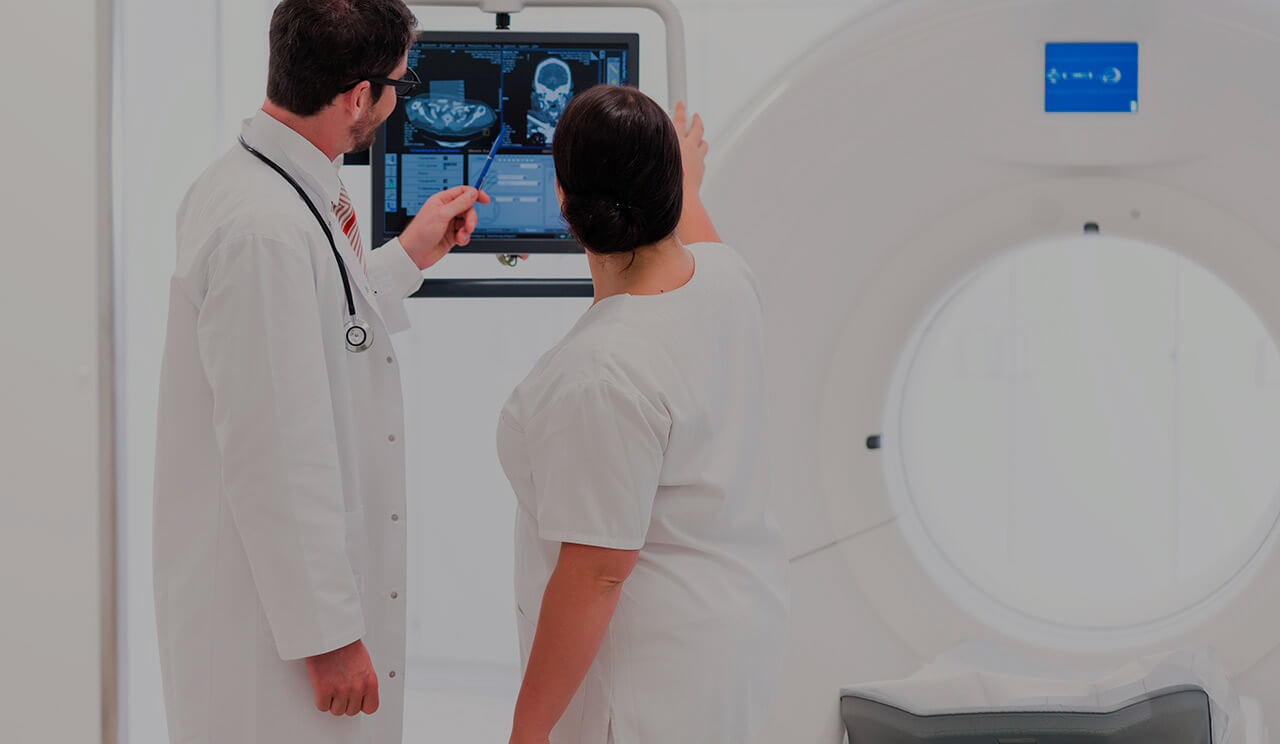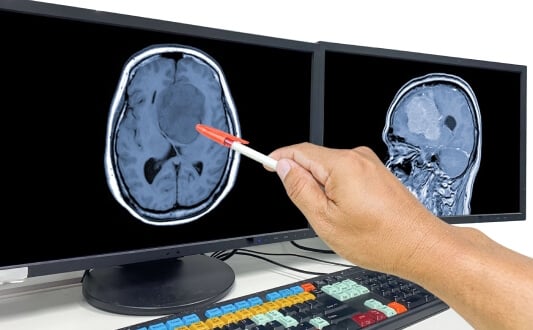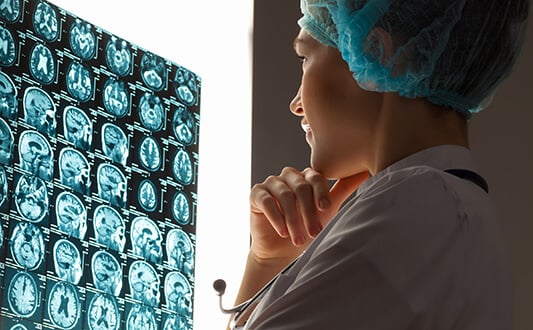The brain is actively growing since the very birth to ensure the acquisition of new skills and mental development. Intensive division of cells of different brain parts in a number of cases leads to the fact that some of them continue to grow and multiply uncontrollably. That’s how tumors that affect the central nervous system appears. Over time, tumors increase in size and begin to affect the patient’s well-being. The peak of tumor detection of brain tumors in children is around 4-years of age, more often the disease is diagnosed in boys.
Content
- Peculiarities of brain tumors in childhood
- Causes of brain tumors in children
- Symptoms of brain tumors in children
- Symptoms of brain tumors in newly born children
- Required diagnostics of brain tumors in children
- Diagnostics of brain tumors in children abroad with Booking Health
Peculiarities of brain tumors in childhood
All brain tumors in children are divided into benign and malignant. Benign tumors grow slowly and do not present danger to life. This kind of neoplasm doesn’t require active treatment as it is enough to regularly watch them with the help of CT/MRI. Malignant brain tumor in children, especially its embryonic variant, grows rapidly and often metastasizes to other parts of the nervous system through the cerebrospinal fluid (a fluid that feeds the brain and spinal cord). This type of neoplasm requires immediate and prolonged treatment.
Malignant brain tumor in children originates from several types of cells of the nervous system. Most often the cells of glia are in the role of the oncologic process source. Glia is tissue, which protects and nourishes neurons.
Depending on the location and cellular composition, these types of tumors are distinguished by:
- Tumors of the posterior cranial fossa are diagnosed in 60% of cases. The cerebellum and the brain stem are situated in this part of the skull. Ependymomas (tumors of the meninges), astrocytomas, gliomas and medulloblastomas develop here. In this case, the brain stem tumor in children is almost always a glioma. This is a very specific type of neoplasm.
- Tumors in the cerebral hemispheres are found in 30-40% of cases. Primitive neuroectodermal tumors (PNEO), ependymomas, astrocytomas, oligodendrogliomas and germinative cell tumors are more often detected here.
- Tumors of the spinal cord occur in 4% of cases. Ependymomas, astrocytomas and PSEs are diagnosed in the spinal cord.
- Metastases of other tumors into the brain make less than 1% of cases.
Causes of brain tumors in children
Neonatal brain tumors is often connected to the impaired development of the baby in the womb of the mother. Neoplasms of the brain in young children are accompanied by other congenital malformations, for example, heart defects and developmental disorders of the skull bones. Also, newborns are more sensitive to external mutagenic factors. So, the impact of radiation and chemicals directly affects the DNA of the child's cells, which can become one of the causes of a brain tumor
One more risk factor of developing the oncopathology are severe viral diseases. Clearly, it’s impossible to accurately define what the causes of brain tumors in each certain case are. However, a clear link to the viral infections of the central nervous system can be observed. For instance meningitis, encephalitis
Genetic factors hold a considerable place among the causes of this oncopathology in children. The inherited "breakdowns" in the genes disrupt the process of cell multiplication, which become a cause of brain tumor appearance at any age. For example, this occurs with neurofibromatosis and tuberous sclerosis. We cannot influence genetic factors. Therefore such children are given special attention.
Mechanic injuries and disorders of metabolic processes in the brain trigger the development of oncologic process. Damage to the brain and pathological changes in inflammatory and viral diseases adversely affect the process of cell division, which becomes a cause of brain tumor.
Symptoms of brain tumors in children
Symptoms of brain tumors in children occur due to the increased brain volume because of the growing tumor. Simultaneously, the intracranial pressure increases, the natural spinal fluid flow is disrupted and blood flow to the brain decreases. This process leads to the oxygen deficiency and death of a part of the brain cells. Symptoms of brain tumors in children depend on the stage of the process and child’s sensitivity. Symptoms of brain tumors in children can be non-specific, similar for many diseases and specific, peculiar just for oncologic pathology.
Non-specific manifestations of the illness include:
- Fatigue, the child loses interest in toys and outdoor games
- Lethargy and apathy, the child becomes inhibited
- Sleep disturbances, when the child restlessly sleeps at night and tries to fall asleep during the day
- Irrational emotional reactions, the child is capricious and cries for no reason
- Memory impairment and concentration of attention span is also a symptom of brain tumors in children
- Lack of appetite and weight loss
Specific symptoms of brain tumors in children include the following:
- Constant and intense headache, which does not decrease after taking painkillers and is mistaken for a migraine
- Nausea and vomiting without food causes. Vomiting improves the general condition, and the headache passes for a while
- A shiver in the hands that manifests when doing something
- Impaired coordination of movements, which is noticeable when trying to take a toy or participating in mobile games is also a symptom of a brain tumor in children
- Another symptom of a brain tumor in children of a younger age is the loss of the ability to walk. The child prefers to sit and lie, as s/he cannot stay in an upright position
- Speech impairment includes vague pronunciation of words and individual sounds, slowing down the speed of conversation
- In addition, the symptoms of brain tumors in adolescents include isolation and lack of contact with peers in a previously sociable child, deteriorating academic performance and behavioral change
- At later stages of the disease there are visual impairments and convulsion
When the medulla oblongata is damaged (part where the brain stem continues into the spinal cord), difficulty in swallowing solid and liquid food, respiratory distress and problems with the rhythm of the heart are added to the symptoms of the brain tumor in children. When the tumor is located near the pituitary gland and the hypothalamus, the level of hormones and the work of the endocrine glands subordinate to them (for example, the thyroid gland, the female and male gonads) is disrupted.
Symptoms of brain tumors in newly born children
Symptoms of brain tumor in children are tightly connected to their age. Thus, tumor grows faster in newly born babies because of the brain immaturity and the lack of specific immunity. Despite this, the symptoms of a brain tumor in young children appear later, as the increase in the volume of the brain is partially compensated by the plasticity of the skull bones, the divergence between the bones and the bulging of the fontanelle. At the same time, the child's head is visibly deformed, which is often the reason for contacting a doctor.
It should be noted that the symptoms of a brain tumor and severe hydrocephalus in young children are the same. Nonspecific complaints such as restless night sleep, capriciousness, decreased appetite and a lack of weight gain, indifference to toys and lack of emotional reactions, lack of response to relatives predominate.
The focal symptoms of a brain tumor in young children are practically not detected due to the immaturity of the nervous tissue and the impossibility of assessing the child's condition objectively (for example, giving him/her a specific task and looking at the result). Moreover, hydrocephalus hides minimal focal symptoms, which affects the child's condition to a greater extent.
Required diagnostics of brain tumors in children
In case of complaints and persistent deterioration of the child's condition, it is necessary to contact the pediatrician or neonatologist who will explain how to determine a brain tumor in children with the help of laboratory and instrumental methods.
Symptoms of a brain tumor in children are found even during the casual examination. In young children, the doctor will evaluate the psychomotor development by months of life and the condition of the fontanelles, in older children - focal symptoms and other neurological manifestations. If necessary, the general physician will give directions to a narrow specialist - neurologist, ophthalmologist, endocrinologist. It’s impossible to detect the unique symptoms of brain tumor in children by means of laboratory tests. The tests can show the decrease in hemoglobin levels, worsening of liver and kidney function, signs of an inflammatory process. In certain types of tumors, a blood test for tumor markers will be helpful as well.
Neuroimaging techniques are the most precise way to detect the symptoms of a brain tumor in children, including the following:
- Neurosonography is an ultrasound of the brain, which in young children is carried through a large fontanel. The study is completely safe, does not require special training, and is most comfortable during sleep.
- CT scan / MRI of the head. Tomography reveals neoplasms of the brain most accurately. During the study, the child should lie absolutely still. That’s why children of an young age undergo a tomography under general anesthesia.
Diagnostics of brain tumors in children abroad with Booking Health
Early and accurate diagnostics of a brain tumor is the key to the successful treatment and normal development of a child in the future. In search of experienced doctors and modern diagnostic equipment, many parents contact hospitals abroad. Examination and subsequent treatment in a child, especially in a young child, has a number of peculiarities, from the documents preparation, to booking a suitable accommodation and making a deposit for admitting a minor patient.
The medical tourism operator Booking Health will help you consider all the nuances of admission to leading foreign clinics. Booking Health specialists have been organizing medical programs for patients from 75 countries for over 10 years.
Booking Health specialists:
- Help with choosing the right hospital and doctor
- Establish communication directly with your doctor
- Prepare and explain medical program in advance
- Provide favorable costs, without overpricing and additional coefficients for foreign patients (saving up to 50%)
- Book the appointment on the necessary date
- Monitor medical program at all stages
- Help in buying and forwarding of medicines
- Communicate with the hospital after treatment completion
- Control invoices and return unspent funds
- Arrange additional examinations, if necessary
- Provide you with service of the highest level: booking hotels and plane tickets, transfer organization
Fill in the "Send request" form on the Booking Health website, and within 24 hours a medical advisor or patient case manager will contact you.
Choose treatment abroad and you will for sure get the best results!
Authors:
This article was edited by medical experts, board-certified doctors Dr. Nadezhda Ivanisova, and Dr. Bohdan Mykhalniuk. For the treatment of the conditions referred to in the article, you must consult a doctor; the information in the article is not intended for self-medication!
Our editorial policy, which details our commitment to accuracy and transparency, is available here. Click this link to review our policies.
Sources:
National Center for Biotechnology
WHO – World Health Organization
Read:
Innovative methods of brain cancer treatment in Germany
Innovative Treatment for Glioblastoma in Germany: Dendritic Cell Therapy for Cancer
Don't know where to start?
Contact Booking Health







